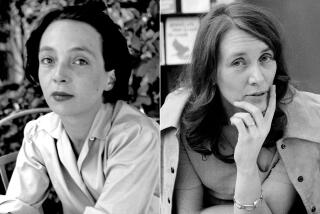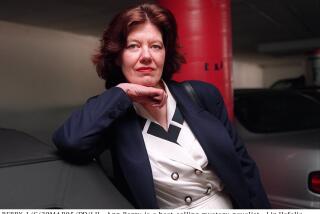The Bible as Radical Diet Plan : MILLROY THE MAGICIAN, <i> By Paul Theroux (Random House: $24; 448 pp.)</i>
“My name is Millroy and I am a messenger, he said.
He leaned his wide bright face into the bigness of the TV screen.
I was once so fat I was imprisoned in the darkness of my body--trapped in my own fatness. Every day was a living hell, and I suffered just like you. But the Lord spoke to me saying, ‘Change your ways, Fatso!’ ”
So begins one of Millroy the Magician’s evangelical diatribes in Paul Theroux’s new novel. This is a book about food, religion and the manipulation of power in America. It is not altogether appetizing.
In Theroux’s classic novel, “The Mosquito Coast,” Allie Fox had given up on American culture and moved his family to the jungles of Central America to begin anew. Millroy, however, is committed to social change at home through diet. Millroy the Magician is well drawn, a dangerous and irresistible prophet. His medium is television. His approach is religious. His temple becomes “The Day One Diner.”
The story begins at the Barnstable County Fair. The narrator is Jilly Farina, a 14-year-old girl under 5-feet-2 who wears size 4 1/2 sneakers. Her mother is dead. Her father is a drunk and she lives with her abusive grandmother, Gaga. Jilly left home to find a little magic. Millroy changes her life, and before she realizes what has happened she is his assistant Annette dressed in a slinky bathing suit, a sequined cape, wearing red lipstick and high heels. (This book will make any feminist or children’s rights advocate cringe.) “We were lost souls, though we didn’t know that until we met. Now we are one complex organism,” Millroy tells Jilly.
Within 24 four hours of their new relationship, Millroy makes an elephant disappear, pulls an eagle from the folds of the American flag, then privately pokes a rubber tube up his nose in order to pump sledge out of his stomach to see how his food is digesting. “People are obsessed by the way they look,” he was saying. “But that’s the exterior. What about the inside, which is much more important? You have to know the condition of your stomach and gut.” Millroy the Magician has one agenda: to make America regular. “Bowels are more important than vowels.”
Paul Theroux’s critique of America through our dietary intake is a provocative one. Our panoply of fast-food outlets, from McDonalds to Taco Bell to Bub City Crabshack to Carmina Burrito, given the frequency of our visits, our propensity as a people to “eat and run,” is in direct relationship to the quality and thoughtfulness of our lives. “Every meal should be a spiritual experience.” Millroy tells his television congregation.
We can believe but who has the time?
As readers, we get Millroy’s point almost immediately, but then we must suffer through page after page of endless stomach pumpings and intestinal preachings, arduous bouts on the toilet and his impassioned plea to produce “at least two pounds of waste a day.” All these gastronomic details are folded into a religious-right narrative with Millroy gaining celebrity status as America’s nutritional preacher. He develops enemies. Other jealous zealots from other TV-evangelist programs believe he is fouling the Bible by plugging it as “America’s cookbook.” Eventually, they run him out of town and try to have him arrested on charges of tax evasion and child abuse.
Enter Jilly Farina once again. Millroy disguises her as his step-son, Alex. He relies on him/her for his personal salvation. What unfolds is a storyline that resembles the evolution of a cult, with Millroy the Magician as its charismatic leader.Millroy opens the Day One Diner and staffs it with dozens of “Day One Sons and Daughters.” They become both disciples and missionaries, transforming fat Americans into health conscious citizens by serving them Ezelial bread, carrot juice and bean cakes.
Paul Theroux has a good eye for characters. His perceptions as the astute traveler serve him well in fiction. Jilly Farina as the vulnerable devotee of Millroy is not only sympathetic but empathetic in her understanding of her mentor. Millroy is as complex and paradoxical as his magic. On one hand he produces doves and on the other, a sliced index finger that he commands his employees to eat.
The tension that Theroux creates between Millroy and Jilly keeps the narrative moving. Millroy depends on Jilly for spiritual and psychic support. Jilly depends on Millroy for the physical safety and nourishment she never had. Jilly begins to recognize the twisted nature of Millroy, how dark and deep his manipulations have become. “A person with so many surprises had to be full of secrets.” Celebrity has become both his possession and paranoia. She makes brave attempts toward her own sovereignty but can never quite break free. Millroy knows why. “Once you have healed a person they are related to you. Once you have fed a person, they are part of you.”
Theroux repeats a theme found in “The Mosquito Coast” in which the protagonist, in his desire to find alternatives to a failing society, re-creates the social corruption from which he separates himself. Disengaging from the status quo is never easy. Ideals are rarely brought into practice. But the old adage “Absolute power corrupts absolutely” stands up and stares Millroy in the face. No magic can save him from his human frailties.
“Millroy the Magician” has enough power to consume the reader, might even get us to rethink our relationship to food. One can imagine this book assuming cult status on college campuses. It could even do some good. It is an imaginative fiction that exposes the power and manipulation of media in our culture and the effect it is having on our psychological as well as physical health.
Unfortunately, the narrative turns pale when Theroux insists on replacing one orthodoxy for another, brutalizing the reader with excessive and repetitive imagery, platitudes and an arrogance of style that ultimately becomes distasteful. It is in this context that “Millroy the Magician” loses its magic.
Even so, Millroy has a way of getting inside you. I must confess while reading this book I gave up sugar, reopened the Bible if only for recipes and began imagining a country less constipated.
More to Read
Sign up for our Book Club newsletter
Get the latest news, events and more from the Los Angeles Times Book Club, and help us get L.A. reading and talking.
You may occasionally receive promotional content from the Los Angeles Times.







